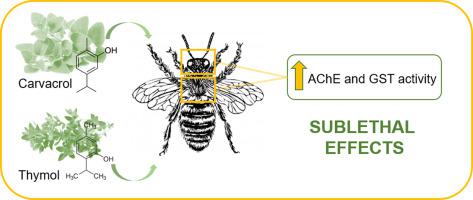当前位置:
X-MOL 学术
›
Pestic. Biochem. Phys.
›
论文详情
Our official English website, www.x-mol.net, welcomes your feedback! (Note: you will need to create a separate account there.)
Comparison of sublethal effects of natural acaricides carvacrol and thymol on honeybees
Pesticide Biochemistry and Physiology ( IF 4.7 ) Pub Date : 2020-06-01 , DOI: 10.1016/j.pestbp.2020.104567 Gordana Glavan 1 , Sara Novak 1 , Janko Božič 1 , Anita Jemec Kokalj 1
Pesticide Biochemistry and Physiology ( IF 4.7 ) Pub Date : 2020-06-01 , DOI: 10.1016/j.pestbp.2020.104567 Gordana Glavan 1 , Sara Novak 1 , Janko Božič 1 , Anita Jemec Kokalj 1
Affiliation

|
The parasitic mite Varroa destructor is a threat to beekeeping colonies. Among naturally derived acaricides, the monoterpenoid essential oil compound thymol is used in beekeeping for varroa mite control, but adverse impacts on honeybees has been already documented. Carvacrol, another monoterpenoid, also has a high acaricidal potential and could thus be promising for regular use in beekeeping, but information is scarce regarding the effects of prolonged systemic administration of carvacrol on honeybees. In this study, we evaluate and compared the sublethal effects of long term consumption of carvacrol and thymol on Carnolian honeybee workers (Apis mellifera carnica). Survival and feeding rate were determined preliminary to assess sublethal concentrations. The sublethal effects were analysed by the activity of the acetylcholinesterase (AChE), enzyme involved in the control of neurotransmission, and the activity of detoxifying enzyme glutathione S-transferase (GST) in heads and thoraces. We found that, thymol and carvacrol, caused mortality only at the highest concentrations tested, 1% and 5% respectively. As demonstrated by others, both substances could be effective against varroa at concentrations ten times lower than those causing significant honeybee mortality. However, we demonstrated sublethal effects at the 0.05% carvacrol and thymol exposure concentrations evidenced as increased activity of AChE and GST in the honeybee heads. In conclusion, prolonged treatment with thymol and carvacrol affects bee nervous system and induce detoxification processes possibly resulting in a limited use for acaricidal purposes. We postulate that under the same chronic exposure conditions carvacrol and thymol will have similar sublethal effects on honeybees.
中文翻译:

天然杀螨剂香芹酚和百里酚对蜜蜂亚致死作用的比较
寄生螨 Varroa destructor 对养蜂群构成威胁。在天然衍生的杀螨剂中,单萜精油化合物百里酚用于养蜂以控制瓦螨,但已经记录了对蜜蜂的不利影响。香芹酚是另一种单萜类化合物,也具有很高的杀螨潜力,因此有望在养蜂业中常规使用,但关于长期全身施用香芹酚对蜜蜂的影响的信息很少。在这项研究中,我们评估和比较了长期食用香芹酚和百里酚对 Carnolian 蜜蜂工人(Apis mellifera carnica)的亚致死影响。初步确定存活率和摄食率以评估亚致死浓度。通过乙酰胆碱酯酶 (AChE) 的活性分析亚致死效应,参与控制神经传递的酶,以及头部和胸部的解毒酶谷胱甘肽 S-转移酶 (GST) 的活性。我们发现,百里酚和香芹酚仅在测试的最高浓度(分别为 1% 和 5%)下才会导致死亡率。正如其他人所证明的那样,这两种物质在浓度比导致显着蜜蜂死亡的浓度低十倍时,都可以有效对抗瓦螨。然而,我们证明了在 0.05% 香芹酚和百里酚暴露浓度下的亚致死效应,这证明蜜蜂头部中 AChE 和 GST 的活性增加。总之,用百里酚和香芹酚长期治疗会影响蜜蜂神经系统并诱导解毒过程,可能导致其用于杀螨目的有限。
更新日期:2020-06-01
中文翻译:

天然杀螨剂香芹酚和百里酚对蜜蜂亚致死作用的比较
寄生螨 Varroa destructor 对养蜂群构成威胁。在天然衍生的杀螨剂中,单萜精油化合物百里酚用于养蜂以控制瓦螨,但已经记录了对蜜蜂的不利影响。香芹酚是另一种单萜类化合物,也具有很高的杀螨潜力,因此有望在养蜂业中常规使用,但关于长期全身施用香芹酚对蜜蜂的影响的信息很少。在这项研究中,我们评估和比较了长期食用香芹酚和百里酚对 Carnolian 蜜蜂工人(Apis mellifera carnica)的亚致死影响。初步确定存活率和摄食率以评估亚致死浓度。通过乙酰胆碱酯酶 (AChE) 的活性分析亚致死效应,参与控制神经传递的酶,以及头部和胸部的解毒酶谷胱甘肽 S-转移酶 (GST) 的活性。我们发现,百里酚和香芹酚仅在测试的最高浓度(分别为 1% 和 5%)下才会导致死亡率。正如其他人所证明的那样,这两种物质在浓度比导致显着蜜蜂死亡的浓度低十倍时,都可以有效对抗瓦螨。然而,我们证明了在 0.05% 香芹酚和百里酚暴露浓度下的亚致死效应,这证明蜜蜂头部中 AChE 和 GST 的活性增加。总之,用百里酚和香芹酚长期治疗会影响蜜蜂神经系统并诱导解毒过程,可能导致其用于杀螨目的有限。


























 京公网安备 11010802027423号
京公网安备 11010802027423号